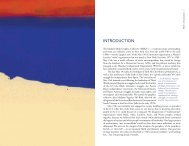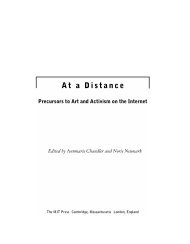Plagiarism: Art As Commodity and Strategies for ... - El plagio literario
Plagiarism: Art As Commodity and Strategies for ... - El plagio literario
Plagiarism: Art As Commodity and Strategies for ... - El plagio literario
Create successful ePaper yourself
Turn your PDF publications into a flip-book with our unique Google optimized e-Paper software.
<strong>Plagiarism</strong> in late capitalist society articulates a semi-conscious cultural condition: namely, that<br />
there 'is nothing left to say', a feeling made more potent by the theoretical possibility of access<br />
to all knowledge brought about by new technologies. The practitioners of much post-modern theory<br />
have tended to proclaim this feeling rather smugly; but if there is nothing to say, they yet demonstrate<br />
that there will always be something to sell. On the other h<strong>and</strong>, there are practitioners active in<br />
many disciplines who, recognising the necessity <strong>for</strong> collective action dem<strong>and</strong>ed by media such as film<br />
<strong>and</strong> electronic tape, engage in plagiarism in an attempt to expose <strong>and</strong> explode once <strong>and</strong> <strong>for</strong> all the<br />
individualistic attitudes which tend to make all current human activity seem redundant <strong>and</strong> increasingly<br />
alienated.<br />
Some of the results of a concerted ef<strong>for</strong>t on the part of practitioners concerned with the analysis<br />
of the untenable contradictions which still in<strong>for</strong>m contemporary artistic practice comprise part of<br />
the Festival Of <strong>Plagiarism</strong>, London & San Francisco 1988.<br />
Tex Beard (written 1987 <strong>and</strong> published simultaneously here <strong>and</strong> in the Edinburgh Review).<br />
WHY PLAGIARISM?<br />
ANYONE with more than half a brain will agree that art has never been a 'superior' activity <strong>and</strong> that<br />
even as a "therapy' it holds little attraction unless one is really raking in the money. Ideologically<br />
art is used to promote an ethic of individual, or separated, subjectivity. Such a practice is encouraged<br />
by high financial rewards, which endow art with the secondary charcteristic of being an 'unofficial'<br />
stock-market, in which capital can be valorised at increasingly accelerated rates.<br />
Regarding the <strong>for</strong>ms of art as propag<strong>and</strong>a, there are a multitude of conflicting opinions, each reflecting<br />
the sectional interets of the varied racketeers with an investment staked in the maintenance<br />
of this society. While some claim that 'art' is the province of a few men (sic) of 'genius', there are<br />
others who shout that 'art must be made by all'. However, these re<strong>for</strong>mist positions never go beyond<br />
rhetoric. <strong>Art</strong> is a commodity relation, <strong>and</strong> the admission of art by all onto the market would cause<br />
a drastic fall in the rate of profit.<br />
<strong>Art</strong> has never been about quality. There is no intrinsic difference between 'failed' works (i.e.<br />
those that remain unsold because their makers are unable to persuade a gallery to promote them<br />
in the market) <strong>and</strong> those which become art upon the realisation of an exchange value. Of course<br />
the 'picture' is somewhat complicated by public <strong>and</strong> corporate 'funding'. Sudsidies are a prestige<br />
investment. The 'art work' itself has always played a secondary role.<br />
<strong>Art</strong> must always emphasise the Individuality' of ownership <strong>and</strong> creation. <strong>Plagiarism</strong>, by contrast,<br />
is rooted in social process, communality, <strong>and</strong> a recognition that society is far more than the sum of<br />
individuals (both past <strong>and</strong> present) who constitute it. In practice social development has always<br />
been based on plagiarism (one only has to observe children to realise that advancement is 99%<br />
imitation), but this reality is mystified by the ideology of 'art'. <strong>Art</strong> itself is based on pictorial traditions<br />
built up over thous<strong>and</strong>s of years, <strong>and</strong> yet art historians <strong>and</strong> critics always focus on the very<br />
minor, usually negligible, 'innovations' of each 'individual' artist.<br />
We are not denying the possibility of rapid trans<strong>for</strong>mation, indeed we are critical of capitalism<br />
precisely because it impedes such a process. Woman creates herself, not individually, but on the<br />
social level. When a mass of people 'believe' something it becomes possible. <strong>Art</strong>, by emphasising<br />
'individual' subjectivity, inhibits the development of a collective inter-subjectivity which could<br />
trans<strong>for</strong>m the world a million times in the time it takes to paint a single picture.<br />
To draw attention to these facts, the literary <strong>and</strong> artistic 'heritage' of womanity must be used<br />
<strong>for</strong> partisan propag<strong>and</strong>a purposes. Naturally, we will go beyond any idea of 'sc<strong>and</strong>al', since the<br />
pseudo-neagation of art has been boring us <strong>for</strong> the past 80 years. Drawing a moustache on the<br />
'Mona Lisa' is not in itself interesting, but it does indicate certain possibilities. The recent<br />
'shooting' of the Leonardo cartoon in the National Gallery (London) was an exemplary act. The<br />
seriousness with which this incident was treated by the media left the majority of the population,<br />
to whom art means nothing, shaking with mirth.<br />
Acts of 'art v<strong>and</strong>alism' are only found shocking by those who see Individual genius' as the ultimate<br />
justification of private property. The appearance of new necessities outmodes previous<br />
'inspired' works. They are obstacles, dangerous habits. The point is not whether we like them or<br />
not. <strong>Plagiarism</strong> necessitates that we go beyond this.






